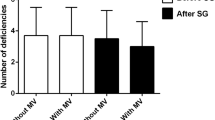Abstract
Introduction
One anastomosis gastric bypass (OAGB) is an effective bariatric procedure. However, nutritional deficiencies or dumping syndrome (DS) may occur. The aim of this study was to assess adherence to nutritional recommendations and development of DS in a 3-year OAGB patient follow-up.
Methods
For 150 OAGB patients, in our center, data were collected through the electronic platform and by an individual telephone interview. The inclusion criterion is OAGB as a primary bariatric procedure, no revisional surgery, or no pregnancy. The adequacy of daily protein intake cutoff was defined as 60 g. Adherence to micronutrient supplementation protocol was considered if a minimum of 5 takes/week were reported. To evaluate the occurrence of DS, the Sigstad score questionnaire was used. For statistical analysis, a significance level less than 5% (p < 0.05) was considered.
Results
A total of 150 patients (80% females), BMI 44.3 ± 21.3 kg/m2, were subjected to the OAGB procedure. Of those, 128 fulfilled the study inclusion criteria. After 3 years, the mean %EBMIL was 78.4 ± 14.4. During the 3-year follow-up, the average protein intake was 60 g/day, and 48% reported an adequate daily protein intake. Adherence to the micronutrient supplementation protocol was reported by 70%. According to the Sigstad score questionnaire, DS was present in 24% of patients.
Conclusion
A significant part of OAGB patients does not comply with the nutrition prescription assessed, emphasizing the need to improve team/patient communication strategies. Long-term studies are needed to characterize and assess the health impact of protein, vitamin, and mineral malnutrition in patients undergoing OAGB.
Graphical abstract


Similar content being viewed by others
References
Jastrzębska MM, Ostrowska L, Wasiluk D, et al. Dietetic recomendations after bariatric procedures in the light of the new guidelines regarding metabolic and bariatric surgery. Rocz Panstw Zakl Hig. 2015;66(1):13–9.
Aills L, Blankenship J, Buffington C, et al. ASMBS allied health nutritional guidelines for the surgical weight loss patient. Surg Obes Relat Dis. 2008;4(5 Suppl):S73–108.
Tack J, Deloose E. Complications of bariatric surgery: dumping syndrome, reflux and vitamin deficiencies. Best Pract Res Clin Gastroenterol. 2014;28(4):741–9.
Deitel M, Rutledge R. Mini-gastric bypass: prevention and management of complications in performance and follow-up. Int J Surg. 2019;71:119–23.
Sigstad H. A clinical diagnostic índex in the diagnosis of the dumping syndrome. Acta Med Austriaca. 1970;188:479–86.
Busetto L, Dicker D, Azran C, et al. Practical recommendations of the obesity management task force of the European Association for the Study of Obesity for the post-bariatric surgery medical management. Obes Facts. 2017;10(6):597–632.
Robert M, Espalieu P, Pelascini E, et al. Efficacy and safety of one anastomosis gastric bypass versus Roux-en-Y gastric bypass for obesity (YOMEGA): a multicentre, randomised, open-label, non-inferiority trial. Lancet. 2019;393(10178):1299–309.
Burgess E, Hassmén P, Welvaert M, et al. Behavioural treatment strategies improve adherence to lifestyle intervention programmes in adults with obesity: a systematic review and meta-analysis. Clin Obes. 2017;7(2):105–14.
Goldenshluger A, Elazary R, Cohen MJ, et al. Predictors for adherence to multidisciplinary follow-up care after sleeve gastrectomy. Obes Surg. 2018;28(10):3054–61.
Kim HJ, Madan A, Lee FD. Does patient compliance with follow-up influence weight loss after gastric bypass surgery? A systematic review and meta-analysis. Obes Surg. 2014;24(4):647–51.
Vidal P, Ramón JM, Goday A, et al. Lack of adherence to follow-up visits after bariatric surgery: reasons and outcome. Obes Surg. 2014;24(2):179–83.
Wheeler E, Prettyman A, Lenhard MJ, et al. Adherence to outpatient program postoperative appointments after bariatric surgery. Surg Obes Relat Dis. 2008;4(4):515–20.
Larjani S, Spivak I, Guo HM, et al. Preoperative predictors of adherence to multidisciplinary follow-up care postbariatric surgery. Surg Obes Relat Dis. 2016;12(2):350–6.
Dagan SS, Tovim TB, Keidar A, et al. Inadequate protein intake after laparoscopic sleeve gastrectomy surgery is associated with a greater fat free mass loss. Surg Obes Relat Dis. 2017;13(1):101–9.
Moizé V, Andreu A, Rodríguez L, et al. Protein intake and lean tissue mass retention following bariatric surgery. Clin Nutr. 2013;32(4):550–5.
Verger EO, Wisnewsky AJ, Dao MC, et al. Micronutrient and protein deficiencies after gastric bypass and sleeve gastrectomy: a 1-year follow-up. Obes Surg. 2016;26(4):785–96.
Dagan SS, Keidar A, Raziel A, et al. Do bariatric patients follow dietary and lifestyle recommendations during the first postoperative year? Obes Surg. 2017;27(9):2258–71.
Hood MM, Corsica J, Bradley L, et al. Managing severe obesity: understanding and improving treatment adherence in bariatric surgery. J Behav Med. 2016;39(6):1092–103.
Kessler Y, Adelson D, Tilbor ML, et al. Nutritional status following one anastomosis gastric bypass. Clin Nutr. 2020;39:599–605.
Machado DA, Friedrich A, Kramer KM, et al. Pre- and postoperative nutritional deficiencies in obese patients undergoing laparoscopic sleeve gastrectomy. Obes Surg. 2012;22(6):881–9.
Chaves YD, Destefani AC. Pathophysiology, diagnosis and treatment of dumping syndrome and its relation to bariatric surgery. Arq Bras Cir Dig. 2016;29(Suppl 1):116–9.
Acknowledgements
All the authors gave the final approval of the version to be published.
Author information
Authors and Affiliations
Corresponding author
Ethics declarations
Ethical Approval
All procedures performed in studies involving human participants were in accordance with the ethical standards of the institutional and/or national research committee and with the 1964 Helsinki declaration and its later amendments or comparable ethical standards.
Informed Consent
Informed consent was obtained from all individual participants included in the study.
Conflict of Interest
The authors declare no competing interests.
Additional information
Publisher’s Note
Springer Nature remains neutral with regard to jurisdictional claims in published maps and institutional affiliations.
Key Points
• Three-year follow-up, 150 OAGB patients: %EBMIL (78%)
• On average, protein intake: 60 g/day; and adequate daily protein compliance: 48%
• Micronutrient supplementation compliance: 70%
• Dumping syndrome: 24%
Rights and permissions
About this article
Cite this article
Andrade, L., Chiote, I., Santos-Cruz, A. et al. Protein Intake, Adherence to Vitamin–Mineral Supplementation, and Dumping Syndrome in Patients Undergoing One Anastomosis Gastric Bypass. OBES SURG 31, 3557–3564 (2021). https://doi.org/10.1007/s11695-021-05428-4
Received:
Revised:
Accepted:
Published:
Issue Date:
DOI: https://doi.org/10.1007/s11695-021-05428-4




